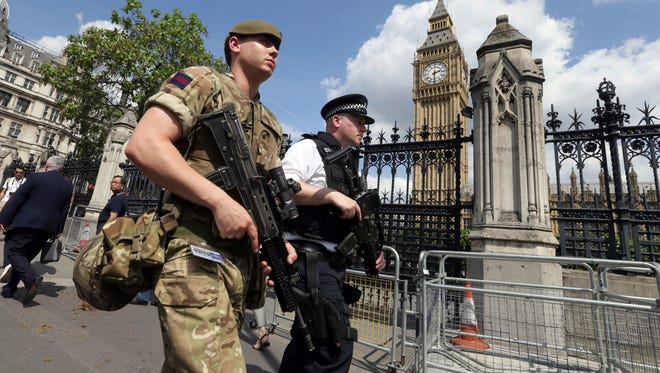Travelers to U.K. will face heightened security after Manchester attack

Tourists heading to London and other parts of the United Kingdom will face heightened scrutiny and security in the wake of a deadly attack at a Manchester pop concert earlier this week.
British Prime Minister Theresa May announced that the terror threat level for the country would be raised from “severe” to “critical” for the time being.
British military has been deployed throughout the country. The prime minister says investigators have concluded that another attack may be imminent.
At least 22 people were killed in an attack at an Ariana Grande concert in Manchester on Monday. ISIS has claimed responsibility for it.
The terror alert has affected tourist destinations. There is extra security at popular attractions such as Kensington Palace and the Tower of London.
According to Parliament’s website, tours of the Houses of Parliament have been canceled through Friday, based on advice from police.
Travel experts say tourists should expect disruptions while trying to visit attractions that remain open.
“Be ready for long lines, reduced and restricted access and, in some instances, no access to places that were historically open to tourists,” says Dan Richards, CEO of Global Rescue, a company that gets travelers out of situations in which they are in danger or ill. “I would prepare for transportation disruptions and generally, a slowing of movement of people in any places where many people tend to go.”
Anthony Roman, a global risk-management expert and president of Roman & Associates in Lynbrook, N.Y., says it would behoove tourists to travel light when they go to any attraction that draws large crowds of people.
“I would avoid bringing backpacks or large pocketbooks of any kind to any tourist sites if in fact they open up again,” he says. “I think you will undergo much closer scrutiny.”
Richards stops short of saying that travelers should avoid the U.K. or Europe entirely. Other destinations, such as Paris, Nice, and Brussels have experienced attacks in recent years.
“Let’s for a minute take a step back and look at the data from the risk standpoint,” Richards says. “You’re more likely to have an illness or injury from much more mundane means than a terror attack.”
A Global Rescue survey released in February found that travelers are thinking about their safety on the road, with 84% of about 1,000 respondents saying that they are at least “somewhat concerned” about it. Despite that, nearly all--96%--say it’s either “likely” or “very likely” they will travel this year.
Europe emerged as a top destination to be concerned about, according to the survey, which was conducted on Dec. 28, 2016 after attacks in other parts of Europe.
Among respondents who expressed some level of concern about travel safety, 75% pointed to Europe, followed by 73% who mentioned Africa and the Middle East. Terrorism was their biggest worry, with 55% ranking it either first or second on a list of greatest threats while traveling this year.
Previous attacks in Europe have led to a decline in tourism to those areas. After the November 2015 attack at a concert at the Bataclan in Paris and coordinated attacks that killed about 130 people around the city, France went into a state of emergency.
According to market research firm Euromonitor, inbound tourism to France went from 84.5 million to 79.7 million, down 6%, from 2015 to 2016. Other European destinations such as Germany, Brussels, and even the U.K. had declines over 5% to 8%.
But Caroline Bremner, head of Travel at Euromonitor, says the Manchester attack is likely to have “a minimal negative effect on inbound demand.”
The firm is still predicting an increase of arrivals to the U.K. of 4.9% to 36.7 million this year. That is a 0.3% decline from its original projections.
“The response from the government will be critical to reassure U.K. residents and foreign visitors to help assuage public concerns about safety and security,” she says. “Sadly, terrorism is a threat that all destinations and countries face.”
Roman says travelers will have to assess their tolerance for risk and remain vigilant, especially when in large crowds.
“Increase your awareness, report suspicious activity, understand what you need to report to police, and be observant of your surroundings,” he says.
Manchester is a cultural and sporting destination shaken by terror